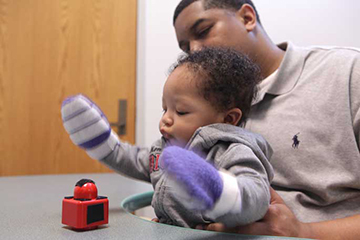Vanderbilt Kennedy Center (TN UCEDD, LEND, IDDRC) Investigator Says 'Sticky Mittens' Offer Clues to Infant Development
February 8, 2016

|
Early motor training in infants may result in positive long-term effects in other areas of development, according to a collaborative study by researchers at Vanderbilt University, the University of Pittsburgh, and Seton Hall University.
Infants' early learning experiences have been found to positively affect later development through processes called "developmental cascades." For example, walking and fine motor skills have been associated with vocabulary size and later language development. These cascades have been commonly theorized but until now evidence supporting them has been largely correlational. A new study demonstrates a powerful link between training infants to reach for an object and later heightened interest in objects and focused attention. Results were published online by Developmental Science.
"This research tells us that babies are having experiences early in life that they build on and that provide a foundation for further learning," said Amy Needham, professor and chair of psychology and human development at Vanderbilt's Peabody College of education and human development. Needham also is a Vanderbilt Kennedy Center investigator.
Needham and colleagues facilitated parent-guided reaching training for 36 3-month-old infants for 10 minutes a day for two weeks. (Reaching behaviors typically do not emerge until a child is between 4 and 6 months old.)
In the training, half of the infants were outfitted with "sticky mittens"-mittens with Velcro that enabled blocks also covered with Velcro to adhere to their hands. Parents were instructed to encourage their children to reach for the blocks. The control group wore mittens without Velcro, and the blocks-covered with tape-were touched to their hands without adhering.
Prior research showed that improvements in object engagement and object exploration were observed immediately after training ended: results showed that the infants who had received active motor training (via the sticky mittens) showed more visual interest in a toy and were less distracted during play. They also grasped and rotated the toy for longer periods of time than the other infants. The results remained evident a year later when 25 of the infants were tested again. Using the Early Childhood Behavior Questionnaire, the researchers also learned that the sticky mittens group had higher attention focusing ratings than the other infants.
"It is amazing to think that roughly two hours of additional experiences with successful reaching at age 3 months led to changes in the infants' exploration and attention focusing skills after 12 months," said lead author Klaus Libertus, research assistant professor at the University of Pittsburgh. "This demonstrates the profound impact that early experiences can have on a child's continued development. In a sense, the children just kept on providing themselves with new experiences and opportunities once the training sessions ended."
Needham began this research while at Duke University and earned a grant for the study from the National Institutes of Child Health and Human Development. "These findings support the notion of developmental cascades and suggest that motor training may also foster the development of social and cognitive skills," Needham said.
Because reduced grasping activity and delays in motor skill development have been associated with risk for developmental disorders, the findings may have implications for autism and Down syndrome research.







